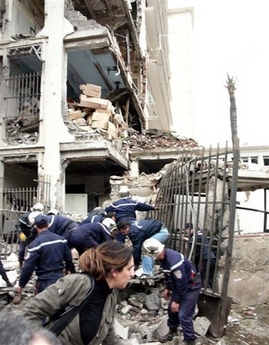Al-Qaida attacks Algeria, killing 24
(AP)Updated: 2007-04-12 07:52
ALGIERS, Algeria - Al-Qaida's new wing in North Africa claimed responsibility for suicide bombings that ripped through the prime minister's office and a police station in Algeria on Wednesday, killing at least 24 people. The attacks highlighted the menacing spread of Islamic militancy across North Africa.
 Rescuers and firemen search through rubble after a bomb exploded near the prime minister's office in Algiers, Wednesday, April 11, 2007. [AP]  |
One car bombing tore holes in the walls of the prime minister's office, where people in bloodstained clothes stumbled toward ambulances. Two other vehicles exploded outside a police station east of the capital, blasting craters into the ground and damaging the building. Some 222 people were wounded.
The group that claimed responsibility, al-Qaida in Islamic North Africa, has carried out a series of recent bombings jeopardizing Algeria's tentative peace. The country, a staunch U.S. ally in the war against terror, has been trying to turn the page on a 15-year Islamic insurgency that killed 200,000 people.
Until recently, the peace efforts seemed successful: Military crackdowns and amnesty offers had turned Algeria's militants into a ragtag assembly of fighters in rural hideouts.
But late last year, the main Algerian militant group, the Salafist Group for Call and Combat, changed its name to al-Qaida in Islamic North Africa and began targeting foreigners - signs the dwindling ranks of Islamic fighters were regrouping.
The latest attacks were the deadliest in the Algiers region since 2002, when a bomb in a suburban market killed 38 and wounded 80. The bombing of the prime minister's office was among the most brazen attacks in Algerian history.
Wednesday's date, April 11, has potentially symbolic meaning: Attacks on the 11th day of the month are a hallmark of al-Qaida and its admirers.
Prime Minister Abdelaziz Belkhadem, who was not in his office during the attack, called the bombings a "cowardly, criminal terrorist act" as he spoke to reporters outside the wrecked building. Parts of six floors were ripped away, and the iron gates outside were bent by the blast's force.
The government did not name suspects. But Al-Jazeera television reported receiving a call from a spokesman for al-Qaida's North Africa wing saying three suicide bombers in vehicles packed with explosives carried out the attacks.
The bombers had three targets, the caller said: The prime minister's office, the Interpol offices and a special police forces building in the eastern suburb of Bab Ezzouar. An Interpol spokeswoman, however, said the international police organization has no office in that suburb, about 10 miles away from the prime minister's office.
Two police officers in Bab Ezzouar said separate suicide bombers struck there. Fahem Abderraman, wounded in that attack, said he was driving by the station when a strong explosion blasted through the car.
"I thought I had gone to heaven," said Abderraman, whose neck was bandaged.
The blast at the prime minister's office took place about 10:45 a.m., and witnesses said the attack on the police station came minutes later.
Fayza Kebdi, a lawyer who works opposite the government building in Algiers, said the explosion shattered her windows and blew her husband across the room.
"We thought the years of terrorism were over," she said. "We thought that everything was back to normal. But now, the fear is coming back."
Witnesses said they saw a red car drive toward the prime minister's office, that police opened fire to try to stop it, and that the car then exploded. A charred, wrecked car lay on the pavement near the building - a modern white high-rise that also houses the Interior Ministry.
Civil defense officials reported that the bombing of the government building killed at least 12 people and injured 135. Their statement said 12 others were killed and 87 wounded in the attack on the police station, which is on the road to Algiers' airport.
Of the wounded, 57 were being kept in hospitals Wednesday night, while the rest were treated and released, the Interior Ministry said.
The bombings came one day after three suspected terrorists in neighboring Morocco blew themselves up as police were closing in, and a fourth was shot and killed by police while he appeared to be preparing to detonate his explosives.
In Morocco, Interior Minister Chakib Benmoussa said Moroccan investigators have not established links between the violence there and in Algeria but "we don't rule it out."
Nevertheless, the back-to-back events illustrated how North African nations are struggling to contain Islamic extremism.
Experts and intelligence officials are concerned that militants could extend their attacks across the Mediterranean to Europe. The problems in Iraq, as well as the Israeli-Palestinian crisis, are fueling North Africa's Islamist movement, said Louis Caprioli, former assistant director of France's DST counterterrorism and counterintelligence agency.
Those issues are "mobilizing people and legitimizing their combat," he said.
Algeria's insurgency broke out in 1992 after the army canceled legislative elections that an Islamic party appeared set to win.
Ensuing violence left an estimated 200,000 dead - civilians, soldiers and Islamic fighters - according to the government. Algeria's military led a crackdown on militants hiding out in the country's brush and mountains, while the government tried to reconcile the nation with amnesty offers to militants willing to turn in their weapons.
The prime minister expressed bitterness at insurgents who refused the amnesty.
"The Algerian people stretched out a hand to them, and they respond with a terrorist act," he said, adding that legislative elections would proceed as planned on May 17.
Al-Qaida's North Africa wing has claimed responsibility for several recent attacks on foreigners.
A March 3 bombing of a bus carrying workers for a Russian company killed a Russian engineer and three Algerians. An Algerian and a Lebanese citizen were killed in a December attack near Algiers that targeted a bus carrying foreign employees of an affiliate of Halliburton.
|
||
|
||
|
|